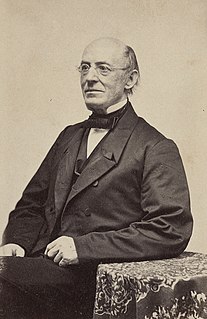A Quote by Henry Ward Beecher
All higher motives, ideals, conceptions, sentiments in a man are of no account if they do not come forward to strengthen him for the better discharge of the duties which devolve upon him in the ordinary affairs of life.
Related Quotes
It is for us to discharge the high duties that devolve on us, and carry our race onward. To be no better, no wiser, no greater than the past is to be little and foolish and bad; it is to misapply noble means, to sacrifice glorious opportunities for the performance of sublime deeds, to become cumberers of the ground.
Have faith in man, whether he appears to you to be a very learned one or a most ignorant one. Have faith in man, whether he appears to be an angel or the very devil himself. Have faith in man first, and then having faith in him, believe that if there are defects in him, if he makes mistakes, if he embraces the crudest and the vilest doctrines, believe that it is not from his real nature that they come, but from the want of higher ideals.
Four experts had an appointment with an ordinary man. They needed him to ratify their findings, or anything they achieved would be meaningless. As they drove to meet him, they knocked down a man on the road. He was dying. If they tried to save him, they might miss their appointment. They decided that their appointment, which concerned all of us, was more important than the life of one man. They drove on to keep their appointment. They did not know that the man they were to meet was the man they had left to die.
In the higher walks of politics the same sort of thing occurs. The statesman who has gradually concentrated all power within himself ... may have had anything but a public motive... The phrases which are customary on the platform and in the Party Press have gradually come to him to seem to express truths, and he mistakes the rhetoric of partisanship for a genuine analysis of motives... He retires from the world after the world has retired from him.
If Christianity has really come from heaven, it must renew the whole life of man; it must govern the life of nations no less than that of individuals; it must control a Christian when acting in his public and political capacity as completely as when he is engaged in the duties which belong to him as a member of a family circle.
Christianity set itself the goal of fulfilling man’s unattainable desires, but for that very reason ignored his attainable desires. By promising man eternal life, it deprived him of temporal life, by teaching him to trust in God’s help it took away his trust in his own powers; by giving him faith in a better life in heaven, it destroyed his faith in a better life on earth and his striving to attain such a life. Christianity gave man what his imagination desires, but for that very reason failed to give him what he really and truly desires.
There is a time in every man's education when he arrives at the conviction that envy is ignorance; that imitation is suicide; that he must take himself for better, for worse, as his portion; that though the wide universe is full of good, no kernel of nourishing corn can come to him but through his toil bestowed on that plot of ground which is given to him to till. The power which resides in him is new in nature, and none but he knows what that is which he can do, nor does he know until he has tried.





































